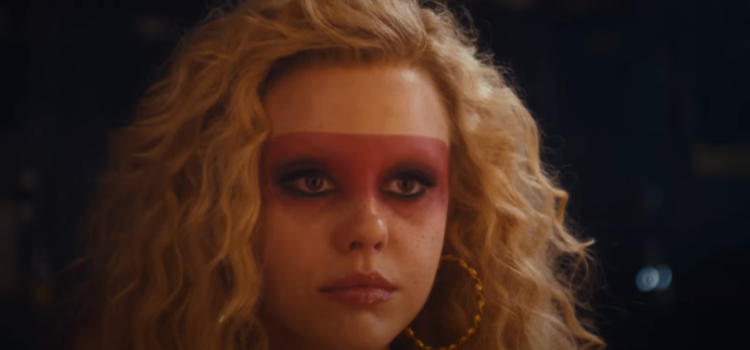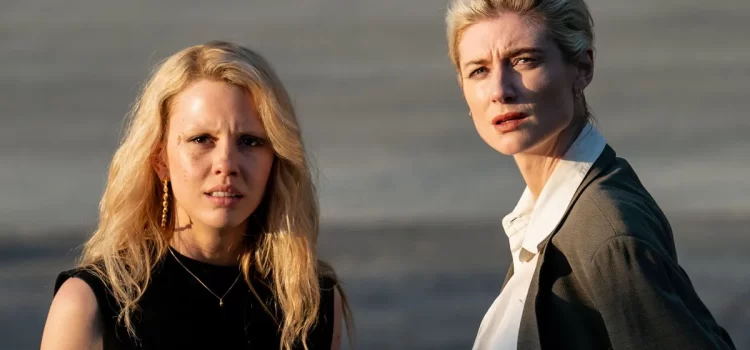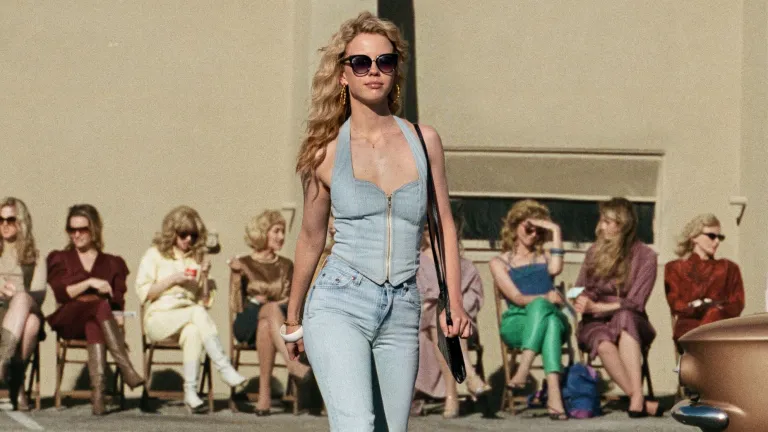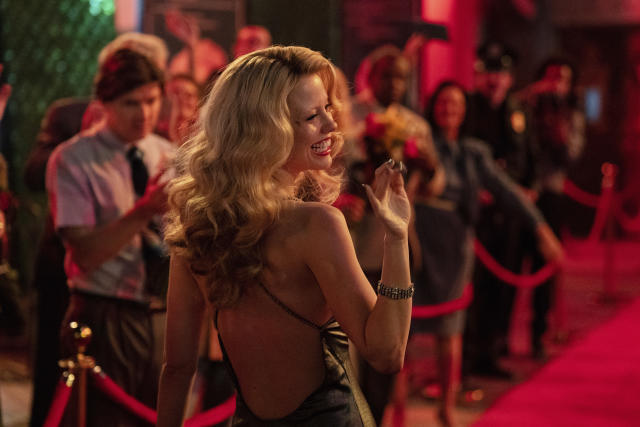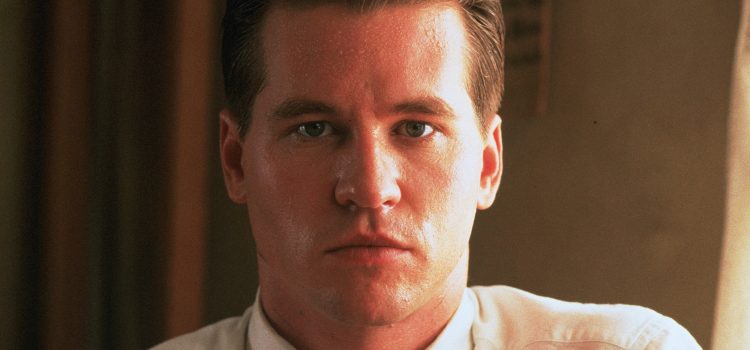By Lynn Venhaus
Bursting with style and verve, director Ti West’s “MaXXXine” features yet another outstanding Mia Goth performance, but sacrifices heart in its unwieldy embrace of the past.
Taking place in 1985, West’s film continues the story of Maxine Minx (Goth), the sole survivor of the horrific massacre detailed in the 1979-set “X,” in which octogenarian psycho-killer Pearl (also played by Goth) and her husband Howard (Stephen Ure) murdered the cast and crew of a pornagraphic film shooting on their Texas farm.
Having fled the scene before police arrived, and after squashing Pearl’s head like a pumpkin under the wheel of a pickup truck, Maxine is now trying to make a name for herself in Hollywood, an epicenter of the Satanic Panic. She’s built a robust career in the adult film industry, distancing herself as much as possible from the Texas bloodbath and her televangelist father.
Tough, hardened, and almost scarily determined, Maxine works ‘round the clock to pay the bills and make a name for herself, rushing from strip clubs to porn shoots to downtown peep shows in her white, vanity-plated convertible. Ultimately, Maxine seeks mainstream stardom, and when we first meet her, she’s crushing an audition for a lead role in an upcoming horror film called “The Puritan II,” helmed by no-nonsense director Elizabeth Bender (Elizabeth Debicki).
It’s not getting the part that’s the challenge, though; it’s keeping it, as Maxine’s friends and co-workers start dying grotesque deaths, possibly at the hand of the Night Stalker, who led a very-real reign of terror over LA. The situation is further complicated by the arrival of gold-toothed private eye John Labat (Kevin Bacon), who seemingly works for the killer and threatens to unearth Maxine’s traumatic history, as well two local cops (Michelle Monaghan and Bobby Cannavale) who grow increasingly suspicious about Maxine’s involvement in the murders.
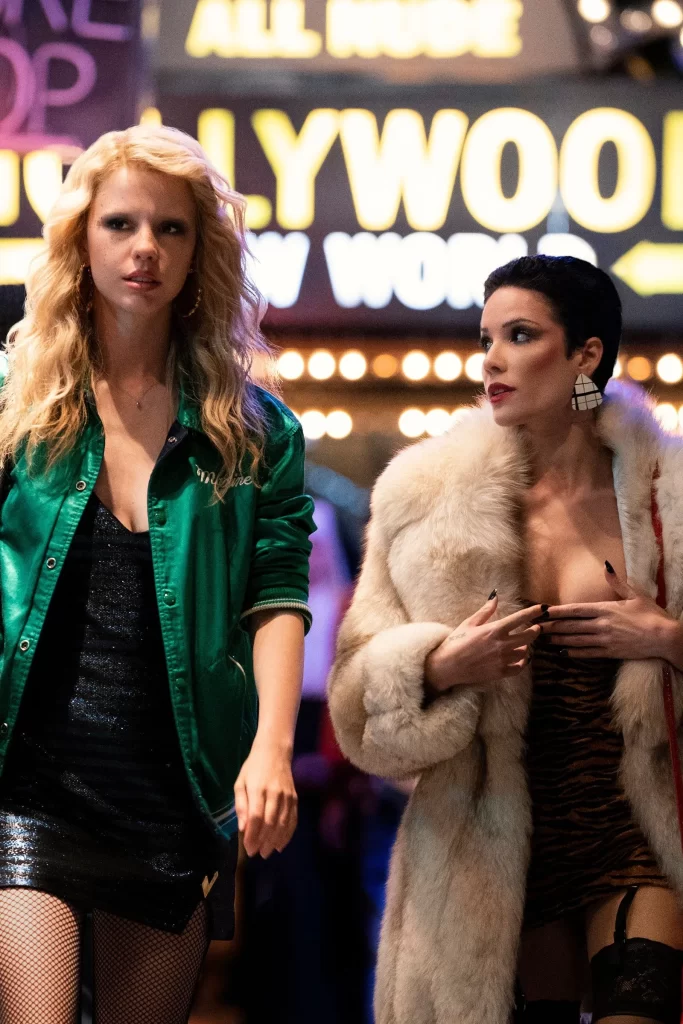
Maxine wants to leave it all behind and pursue her dreams, but she can only outrun her past for so long. Eventually, she must confront it head on, fighting to transform into the Star she’s yearned to become, no matter the cost.
Indeed, “MaXXXine” is a vastly different film from its predecessors, eschewing the ‘70s grittiness of “X” and the technicolor nightmare of “Pearl” to pay tribute to the Video Nasty era of the 1980s, leaning into B-movie tropes. For no matter how engaging “MaXXXine” is in the moment — with immersive scene-setting and plenty of memorable kills — it becomes a disappointingly emotionless experience.
Its numerous threads (each potentially compelling on their own) aren’t given time to breathe or leave a lasting impact. But there’s still an irresistible quality to “MaXXXine” that grows upon further reflection. West’s film is fully committed to its influences, and it takes big swings that, if only intermittently successful, are always interestingly flawed.
Goth gives a typically excellent performance, portraying Maxine as a damaged, fiercely determined anti-hero who wants to leave her trauma behind and carve a bloody new path for herself in the name of pure ambition. There’s little doubt that West and Goth want us to root for Maxine despite her actions (like a run-in with a Buster Keaton look alike that gives new meaning to the name). Goth commands her scenes brilliantly, dishing out her own type of gory empowerment.
The film rarely slows down to let Maxine, or viewers, reflect on all that’s happened, though. And perhaps that’s intentional, as Maxine fears her own memory. Her PTSD pops to the surface in the brief moments when the chaos of her daily life subsides, and she fights to push it down.
West’s approach also reflects a broader issue with “MaXXXine,” however. It’s missing the heart of “X” and, especially, “Pearl,” which were willing to take their foot off the gas to let viewers sit with the characters and help flesh them out beyond their familiar archetypes.
Scenes like Brittany Snow’s rendition of Fleetwood Mac’s “Landslide” in “X” – with a split-screen contrasting the group’s youthful exuberance with the tragedy of Pearl’s missed opportunities — or Goth’s long-take, confessional monologue in “Pearl,” help humanize these characters, breaking conventions to give unexpected emotional weight to outcomes we know will happen anyway.
“MaXXXine” has a couple of those instances, but they’re positioned within a film that’s content to dazzle rather than provoke deeper thought, rushing along to the next kill or reveal without letting these scenes breathe. West surrounds our anti-hero with disposable characters of varying morality and sends us down a predictable rabbit hole of carnage that’s strangely empty, but never boring.
Much of the film’s fun is due to its maximalist style, which echoes the work of Brian de Palma and the giallo genre, with Eliot Rockett’s cinematography drenching scenes in neon hues and creating a tactile grunginess that practically emanates from the screen, supported by a punchy soundtrack, authentic production design, and tongue-in-cheek dialogue that (mostly) fits the lurid, cartoonish rhythms.
The film’s cinematic references are usually amusing, but sometimes little more than novelty, such as multiple visits to the set of “Psycho” that may or may not allude to some sort of meta-commentary.

Supporting players like Bacon and Debicki bring lively energy to their characters, with Bacon appropriately sleazing it up and Debicki depicting her director as someone who’s had to sacrifice much to get to where she is.
Debicki delivers some of the film’s most heavy-handed dialogue – making a “B-movie with A material,” as Elizabeth puts it – but her character maintains a compelling dynamic with Maxine, whose present-day goals keep getting hijacked by figures and memories from her past.
Giancarlo Esposito steals scenes as Maxine’s sketchy “entertainment lawyer” willing to go to extreme lengths to help his clients. Moses Sumney, as Maxine’s friend who runs a video store beneath her apartment, does what he can with a rather thankless role, while Monaghan and Cannavale are only fitfully effective with their good cop/bad cop schtick.
Lily Collins is sadly underutilized as a darkly funny star of the first “Puritan” film, while Halsey, as one of Maxine’s co-stars, with a bizarre accent to boot, is thankfully only around for a scene or two.
Maxine herself is the real star of the show, which she would be happy with. But by oversimplifying the world around her, West makes the moral gray area that made “X” and “Pearl” so exciting practically non-existent here, following through on its predecessors’ themes in unsurprising ways.
The mystery of who’s behind the killings in “MaXXXine” is also eye-rollingly predictable. West hits us over the head with messages regarding societal attitudes towards sex and violence that come across as more in-your-face than involving, complete with a conclusion that goes wildly off the rails and doesn’t feel entirely earned.
Despite all this, “MaXXXine” is still highly entertaining thanks to its direction and Goth’s performance. It’s just an uncharacteristic letdown from West, who presents us with a B movie with B ideas, and an enjoyable albeit undercooked conclusion to his otherwise fantastic trilogy.
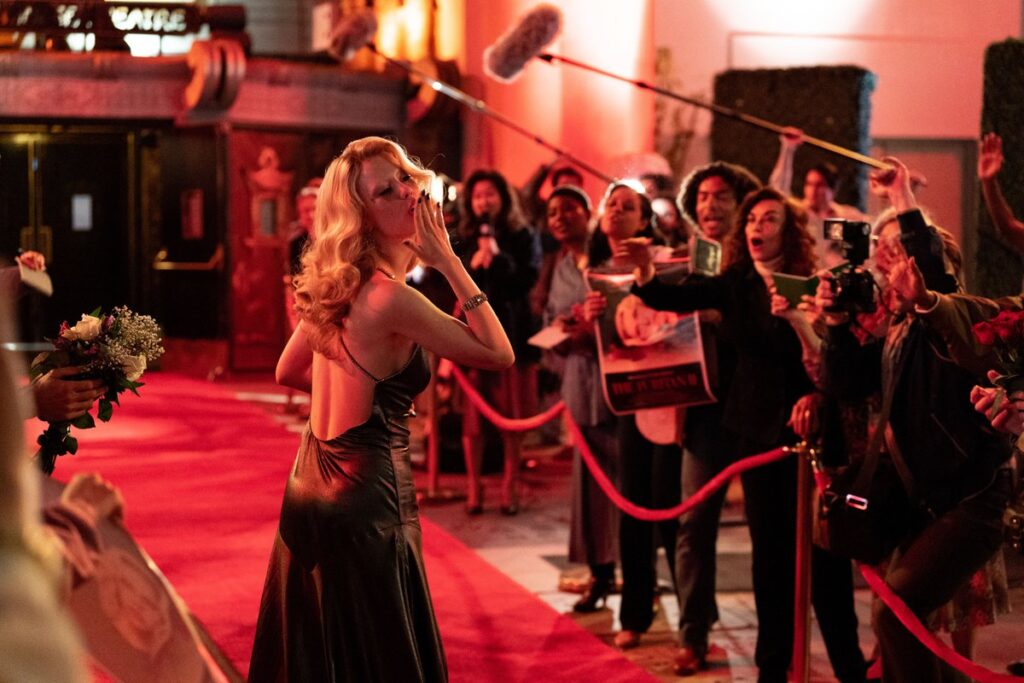
“MaXXXine” is a 2024 horror film directed by Ti West and starring Mia Goth, Elizabeth Debicki, Kevin Bacon, Giancarlo Esposito, Bobby Cannavale, Michelle Monaghan, Moses Sumney, Halsey, Lily Collins, and Simon Prast. It is rated R for strong violence, gore, sexual content, graphic nudity, language and drug use, and has a 1 hour, 44-minute runtime. It opened in theatres July 5. Alex’s Grade: B.
Alex McPherson is an unabashed pop culture nerd and a member of the St. Louis Film Critics Association.

